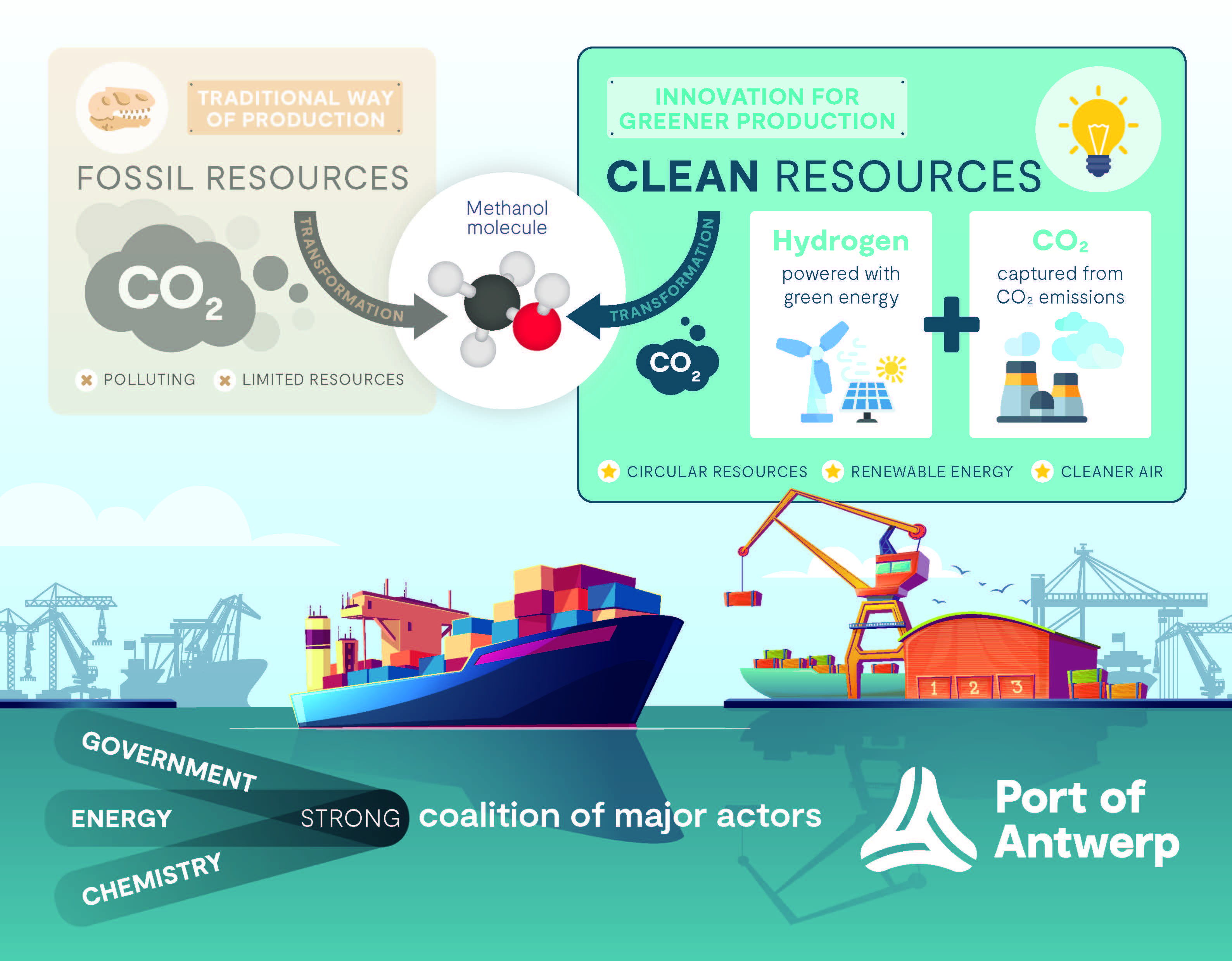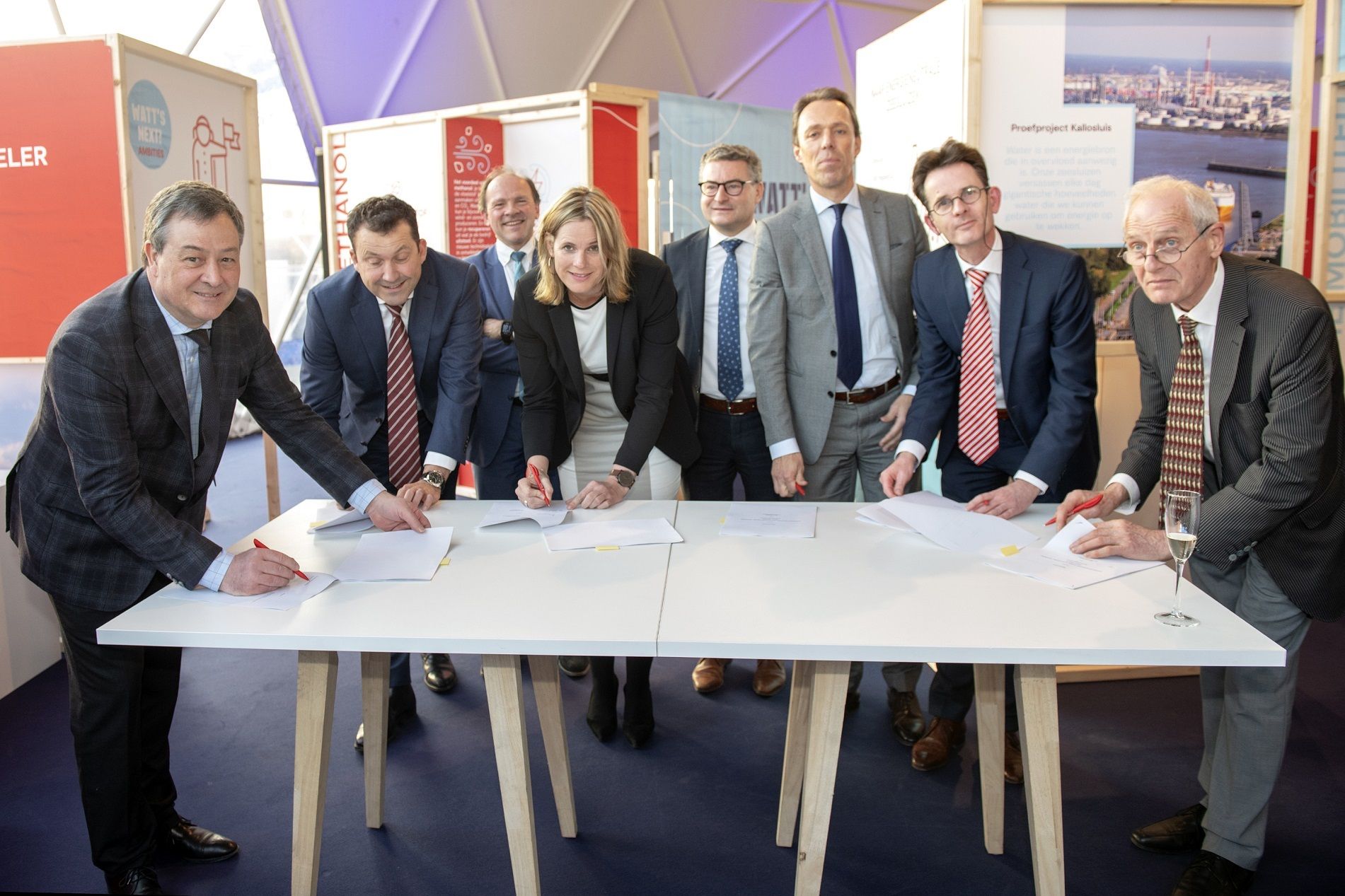Port of Antwerp brings different players together to produce sustainable methanol
Pilot project aims for 4,000 to 8,000 tonnes of sustainable methanol per year
Port of Antwerp is starting the year with an ambitious new project. By bringing various players in the port area together for sustainable production of methanol – an important raw material in the port – it is taking the next step in the transition to alternative energy sources and a carbon-neutral port.
Innovation will be key to the success and economic feasibility of this project, by combining different activities already present within the port platform such as electricity generation, the fuel industry and the chemical industry. The project is complex and challenging, but will be a "first" for Belgium.
Essential for the port
Methanol is an important raw material with multiple uses in the chemical industry, and also has many applications outside of it. With such a large chemical industry inside the port area, this substance is essential for the day-to-day operation of the port. Methanol is the starting point for all sorts of chemical processes used on a daily basis by the industrial players in the port. The port of Antwerp uses around 300,000 tonnes of methanol annually for chemical processes and fuel production: everything from insulation panels to fuel additives.
From fossil sources to sustainably produced fuel
However, methanol is currently obtained from fossil sources that can ultimately run out. By helping to introduce a new production process Port of Antwerp is now taking practical steps towards making the port more sustainable.
"In practical terms we will produce methanol from waste CO2 and sustainably generated hydrogen," explains Didier Van Osselaer, project manager at Port of Antwerp. "The waste CO2 will be collected by a new process called Carbon Capture and Utilisation (CCU) in which at least some of the CO2 emissions are recovered. This CO2 is then combined with hydrogen generated on a sustainable basis using green energy in a new electrolysis plant. These two processes – CCU and electrolysis – together form the perfect basis for producing sustainable methanol."
Smaller footprint, less emissions
In this way Port of Antwerp will avoid producing one tonne of CO2 emissions – or perhaps even twice that amount – per tonne of methanol generated. Methanol can also be used in the future as a sustainable fuel in its own right, with minimum emissions of harmful substances, to power e.g. tug boats or indeed ordinary road traffic. Indeed Port of Antwerp has the ambition of introducing a first methanol-powered tug in the near future.
Close partnerships
To achieve this Port of Antwerp is bringing various experts together. ENGIE, Oiltanking, Indaver, Vlaamse Milieuholding (VMH) and Helm-Proman have all declared their support for this project, and several knowledge institutes have also committed themselves. This is a new step in the direction of an integrated, efficient port by creating a closely-knit port community that works across boundaries between industrial activities. Each partner has its own particular role to play in this project. For instance, ENGIE will contribute its knowledge of the electricity market, Oiltanking will give advice on the logistical aspects of methanol production and storage, while Indaver will offer expertise on collection of CO2. Helm-Proman is involved with a view to finding markets for the methanol that is produced, VMH will be responsible for at least part of the financing, while Port of Antwerp will act as a bridge between the public and private sectors.
Port of Antwerp CEO Jacques Vandermeiren confirms: "With this innovative project we aim to smooth the path for alternative energy sources in the port of Antwerp. I am proud that we are able to sign this collaboration agreement today with five crucial partners from among others the electricity, fuel and chemical industries. Our role as Port Authority is to bring people from different sectors together, in order to face the challenges of tomorrow. Today marks yet another step in the right direction."
Minister Muyters adds: "Innovation is key when it comes to facing challenges large and small. We won't solve the climate problem by taxing entrepreneurs into the ground. This innovative project shows once again that our companies are very much part of the solution, especially when they come together and collaborate as here in the port of Antwerp."
Minister for the Environment, Nature and Agriculture Koen Van den Heuvel is particularly pleased with this initiative: "I am very glad that Port of Antwerp has taken on this role. It shows that we have innovative thinking here in Flanders. Just like the project for onshore power, this project will help us to achieve our ambitious climate objectives. At the same time it will save primary raw materials and take us a step further in the transition to a circular economy."

